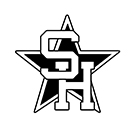Science
Using BC's newly designed curriculum, the Science Department at Sullivan Heights aims to provide students with hands-on experiences in collaboration, critical thinking, and communication - skills they will need to be successful in college, university, and the workforce.
Introduction to Science
Science and scientific literacy play a key role in educating citizens of today for the world of tomorrow. Critical to succeeding in this endeavor are the core competencies that provide students with the ability to think critically, solve problems, and make ethical decisions; to communicate their questions, express opinions, and challenge ideas in a scientifically literate way; and to exercise an awareness of their role as ecologically literate citizens, engaged
and competent in meeting the responsibilities of caring for living things and the planet.
Features of the Science curriculum
With a focus on inquiry and conceptual learning, the Science curriculum provides students with opportunities to ask questions, consider a range of views, recognize their beliefs and opinions, work collaboratively, and ultimately make informed conclusions that lead to personally and socially responsible choices.
The story of science in the curriculum takes the students from observing their immediate environment to engaging in actions and decision making on a global scale as scientifically educated citizens.
First Peoples knowledge and perspectives and other traditional ecological knowledge are embedded throughout the Science curriculum.
Flexible teaching and learning
The Science curriculum allows for instructional flexibility. For example, the curriculum components can be combined in different ways to provide a diverse range of learning opportunities. Within each grade, there are multiple ways to combine Big Ideas, Curricular Competencies, and Content to create lessons, units, and learning experiences. The curriculum encourages the use of a range of approaches that support instruction and acquisition.
Design of the Science curriculum
The Science curriculum has the same format as all other areas of learning. The curriculum elements – the Big Ideas, Curricular Competencies, Content, and elaborations – link the knowing, doing, and understanding of science. By connecting scientific knowledge with a hands-on approach to doing science, the curriculum elements support learning in biology, chemistry, physics, and earth, space, and environmental sciences, leading to a deep understanding of science concepts.
More information on the curriculum model above is available at https://www.curriculum.gov.bc.ca/curriculum/overview.
Contacts
| Bodenschatz | Adam | bodenschatz_a@surreyschools.ca | Teacher | |
| Edwards | Warren | edwards_w@surreyschools.ca | Teacher | |
| Kalsi | Nikki | kalsi_n@surreyschools.ca | Teacher | |
| Khanna | Shilpa | khanna_s@surreyschools.ca | Teacher | |
| Leonard | Lisa | leonard_l@surreyschools.ca | Teacher | |
| Mulji | Waheeda | mulji_w@surreyschools.ca | Teacher/Dept.Leader | |
| Sandhu | Ramina | sandhu_r1@surreyschools.ca | Teacher | |
| Sparkman | Chris | sparkman_c@surreyschools.ca | Teacher | http://sparkmanscience.weebly.com |
| Tait | Curtis | tait_curtis@surreyschools.ca | Teacher | |
| Vokey | Derek | vokey_d@surreyschools.ca | Teacher | |
| Wong | Terence | wong_terence@surreyschools.ca | Teacher | |
| Wu | Jimmy | Wu_J@surreyschools.ca | Teacher | http://mrwu.ca |





